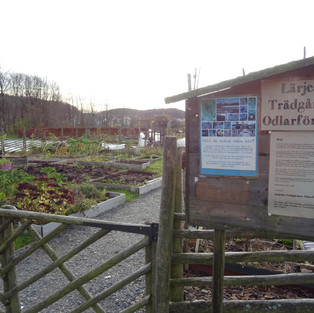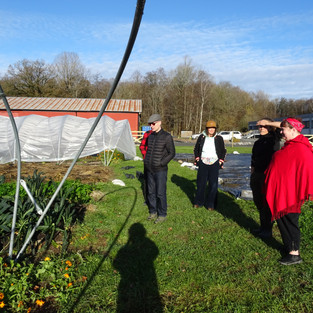Urban fish, free school meals and fighting food waste: learning from Gothenburg’s food system
- Charlie Spring
- Nov 21, 2019
- 7 min read
In October, three Action Research Team members of the SAFE project (Self-organising Action for Food Equity) visited Gothenburg to share and exchange experiences of working across food sectors to achieve better food systems. We savoured the crisp autumn air and leaves during 3 days of visits and new friends. We were welcomed by Robin Biddulph, who’s leading on SAFE Gothenburg. He dined us at Sophanna’s Corner, a new but v homely Cambodian restaurant in Majorna, where we tried waterlily and amok…and came away clutching gifts of bags of Cambodian peppercorns…worlds converge (I'd also like to recognise the Action Research Team members who didn't want our project to support air travel: this made me doubly-determined to make the most of what you can learn from meeting real people in real places, but it raised a really important point about academics' air miles).
Angereds Gård This ‘Model Farm’ project is a collaboration between city and regional government departments, using a former livestock farm to educate and ‘test-bed’ ways of producing food and developing food production skills. After a ride on a comfy, spacious, on-time bus and a stroll along a pretty woodland path (if slippery at points enough for one of us to perform an inpromptu-yet-impressive splits), we were welcomed with coffee and ‘fika’ (an untranslatable concept denoting a daily pause for coffee and snackerels with friends and colleagues- not something that can be done alone at a desk). We met the team in their new, cosy education building. Most staff have a background in education and food growing, and bring skills ranging from hop farming to agroforestry. We discussed common food system issues in both Sweden and the UK (over-reliance on imports, ageing farmers, problematically cheap food…). Gothenburg has the advantage of the city owning thousands of hectares of agricultural and forested land around the city, a legacy of postwar visions for the port city to become a major powerhouse. Angereds Gård is an initiative to build links between the city and its hinterland and to demonstrate a range of functions, primarily adult education and sustainable food production. In the sunshine, we toured the cultivation area- now in late-harvest flourishes of cavolo nero, turnips and spots of herbs and edible flowers. Chief grower Klara has tried out a range of things she likes and grew up cultivating, and piloted CSA-type produce distributions to nearby schools and old people’s homes. It’s worked well, requiring a shift in thinking for courageous chefs willing to work with a bit less predicatability (and a bit more excitement than usual procurement approaches). Integration of immigrants is another aim of the project- and public kitchens have proved a place for people to share recipes, skills and ideas from their homelands.
After showing the team presentations about the work of Sustainable Food Cities (Leon) and Feedback (Lucy), Erica, who works for the regional government (one of the project partners), then took us to Lärjeåns Kafé & Trädgårdar, a delightful canteen serving an array of fresh dishes, some of which is grown in the adjacent garden. I much appreciated the vegetarian sausage pasta being almost identical to the meat version. And discovering that crumble is as much a thing as a home…
Urban aquaponics: letting the seas rest by incorporating fish tanks into flats?
From Angered, we took the tram back into the city centre to an ornate industrial estate whose name ‘slakthuset’ I now realise means ‘abattoir’ (might explain the large meat-smoking business we spotted). There, Niklas Wennberg houses Stadsjord, his enterprise that’s developing aquaponic models that he envisages as a way to let oceans rest by producing fish onland. We visited the tanks of claria (catfish), said to thrive at higher stocking density than other fish species and heard about design work to incorporate claria production into residential buildings. His TEDx talk explains more, and this is clearly deeply committed work in a frustrating field of unhelpful policy, but we had a few queries around how you might achieve greater popularity among eaters of the less-than-pretty catfish.
Good food in schools? Our final visit of the day was to some nearby offices to meet city school catering officer Simone and Eva, a preschool headteacher currently working in a culturally diverse neighbourhood and with experience of working across different educational levels. Each preschool has its own chef and kitchen, and all children get a free breakfast, lunch and snack. Sweden is apparently one of only 3 countries in the world providing universal free school meals throughout a student’s journey (though there are issues with uptake by older children, and familiar stories of takeaways close to schools, and the ‘coolness’ question). Simone coordinates the approach to what is served in school- meat once a week, fish twice, vegetarian twice, with chefs deciding their own menu on a Monday. Until a recent change in government, the City had committed to purchasing 50% organic food, part of a programme to make meals more sustainable without significantly raising costs, though issues included the air miles that might accompany organic supply chains. Asked whether it’s a challenge to meet the diverse cultural needs of children and their families, Eva responded no- the bigger challenge is parents who insist upon strict dietary rules such as their children eating no sugar (which we learned the next day may be because of parents concerned about sugar exacerbating learning or behavioural difficulties).
Landemareskolan: Learning Sustainable Meals
Lucy and I journeyed to the end of the tramline to Landemareskolan, a beautifully-designed S-shaped wooden primary school where, despite it being half-term break, a few children were engaged in pre-Halloween craft activities with parents and teachers. We had a fascinating chat with some of the kitchen staff and teachers about school food. First, it was great to interact with the kitchen staff, and to get a sense of how their work and ideas are included and valued in wider school management.
We learned about the ‘Learning Sustainable Meals’ (LSM) programme, about which the SAFE Action Research Teams had learned during an online chat with Kristina Fermskog earlier in the year (Kristina has had a unique role within the city authorities, scoping opportunities for a sustainable city-region food strategy, a prospect also frustrated by the change in city government). Another impressive programme has enabled schools to collect and collate data on food wastage within school kitchens using a shared online system, which Landemareskolan’s team suggested has resulted in significant reductions in waste generation.
Through LSM, teachers and school chefs had travelled to Malmo to learn about sustainable food (eg. visiting an orchard with 400 apple varieties, eating gazpacho and visiting a school where each child had responsibility for a rabbit), coming back inspired to share what they’d learned with the children. With the kids, they talk about overfishing, watch ‘Young Masterchef’, and travel the world through their senses with the ‘spicy journey’. There’s a vegetable of the month (this month= pumpkin, of course), the kids take turns to don chef clothes and visit the school kitchen, and there’s a ‘food council’ for pupils to hear about school food news and feed it back to their peers. They’ve foraged for and fried up chanterelles in the classroom. At lunch, a separate-item salad bar makes it easier for kids on the autistic spectrum, but all kids are encouraged to ‘eat a rainbow’. They have a school garden that they’d like to invite parents to help care for.
It’s not all rainbows- there are issues, such as supermarkets selling low-cost, poor-quality food interacting with geographical and economic inequities as Sweden undergoes significant demographic and political changes. But the school is changing too, looking at what it can to be more of a community hub- inviting older school children to eat breakfast here, and utilising the space for community and civic events during the holidays.
The trip was informative for us but also a chance for Beata and the Landemareskolan team to learn about Lucy’s dynamic work with the Alchemic Kitchen in Liverpool, with the Alexandra Rose’s fresh food voucher/provision scheme and the many other activities she’s involved with, from public cooking events to academic research. We met Beata later in the day to share one of Gothenburg’s ‘Kanelbullar’, basically a cinnamon bun as large as one’s head (we had sadly missed annual Cinnamon Bun Day). While I’m sure teaching always brings its stresses, there was a palpable sense of food being a way to excite and engage both teachers, students and catering staff, in new ways of thinking about and using food.
The evening saw us attend a food distribution by 'Solidarity Fridge', a network of individuals who've been slowly making arrangements with a supermarket chain to collect unsold food and to distribute it at a delightful former market space (now capacious bike workshop; I couldn't help that such spaces have been fast hoovered up by the claws of luxury housing development across Manchester and other UK cities). Aiming to offer 'solidarity, not charity', in line with the ethics of activist networks like Food Not Bombs, they are open to anyone- and a very peaceful line of people gathered in the cold outside to queue and choose what they wanted. While Sweden's more wealth-distributive policy has likely prevented the spread of food banks and other forms of emergency assistance for those on inadequate incomes, those I spoke to suggested a sense that perhaps Sweden is just a few years behind, with a recent upswing of right-wing populism in municipal and national elections. Robin Biddulph has been leading on SAFE Gothenburg, with a focus on how to network the growing organisations and people involved with raising awareness and redistribution of wasted foods, a theme that was to be further explored on our third day.
Wednesday: meeting Arash Derambarsh, France's food waste legislator We’d sadly lost Lucy (how dare Liverpool need her back to cook up pumpkin soup for a parkful of people?) but Leon and I attended a workshop at Chalmers University with Arash Derambarsh, the Paris lawyer who battled to achieve legislation compelling supermarkets above a certain size to donate all unsold food to charities that might be able to use it. He was being awarded the WIN WIN Gothenburg Sustainability prize (mildly ironically on a day when Greta Thunberg declined to accept another prize). He gave a talk about his journey, predicated on his own struggles with food insecurity when studying. He envisages France’s legislation being spread across Europe, but there wasn’t much time to discuss some of the nuances (the labour involved for supermarket workers, the resources for charities to manage such food, the ethics of presenting ‘the homeless’ as a group who will inevitably benefit from access to such food- do we risk deflecting from the even more difficult work of preventing excessive food wastage and hunger?). There followed some interesting presentations from Swedish researchers looking at waste-prevention via logistics, the challenge of food waste suiting profitability, incorporating surplus blood into processed food products, and our own Robin Biddulph reporting on the SAFE project, which in Gothenburg he has crafted to look at the burgeoning surplus food redistribution scene in Gothenburg, thinking how organisations with different rationales and resources might coalesce around some shared goals or actions.
In between our formal visits, the trip was a chance to hear much more deeply about each other’s work and ideas, over licorice and lingonberries. We’d like to thank everyone who welcomed us with fika and inspiring examples of how things can work better, despite our shared challenges: Kristina Fermskog, Robin Biddulph, Erica Svensson (and Angereds Gård team), Eva Andersson, Simone Johansson, Beata Sandegård, Niklas Wennberg











Comments